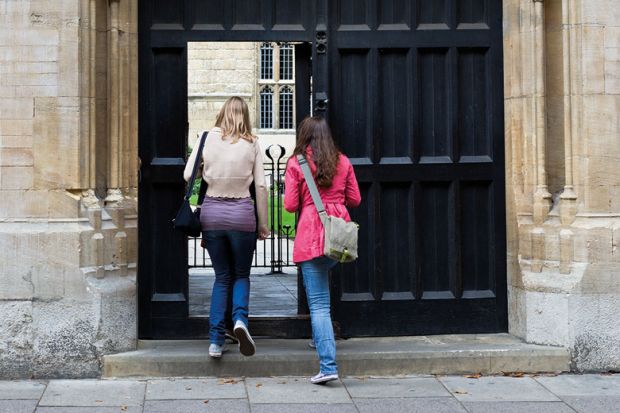
Over the next week, prospective students from across the country and, indeed, across the world, are coming for interviews at the University of Oxford.
But what can you expect if you are coming for an interview?
Here, a selection of current students at Jesus College at the University of Oxford provide some top tips on how you can prepare.
Ayesha, first-year medicine student, from Blackburn
It’s really important to try to stay calm before your interview. Try to be prepared and find a way to relax your nerves. When you’re nervous, you’re less likely to think clearly and logically. This is important because the tutors will want to understand the thought process behind you arriving at an answer, right or wrong.
It always concerned me that I might be presented with a question to which I didn’t know the answer or had never thought about before, and quite often that is the case. In these situations, try to think logically about what you have learnt or read that may help you to arrive at an answer. If you’re really stuck, the tutors will usually prompt you with questions or additional information.
“What would you put in a bone?” was one of the questions I was asked. I answered “calcium”. The tutor asked me why and I responded with “Mum always told me if I drink milk my bones will become strong and milk has calcium”. I knew that it wasn’t a scientific answer and initially I was worried that it would affect my chances of getting in, but I think it showed how I approached a topic that I hadn’t thought or learned about before.
The best way to prepare for your interview is to practise. I did as many mock interviews as I could just so that I could understand, to some extent, the pressure and atmosphere of an Oxford interview, which is quite different from other universities. Even if you don’t end up getting in, it is a great experience to go through.
Ryan, third-year biological sciences student, from Talbot Green, Wales
I was so anxious before my interview. I tried to calm myself down by preparing as much as possible. I made sure that I had answers to any questions that the tutors might ask me about my personal statement.
Of course, you can’t prepare for everything and the very nature of an Oxford interview is to give you a novel problem and see how you cope with it. The tutors are trying to see if you can work logically through problems as a way of gauging whether you’ll benefit from the tutorial system. It’s also important to remember that the tutors are trying to help you through the process and not lead you into traps.
The best advice that I received was to say what you think. Verbally work through whatever problem the interviewer has given you, so that they can follow your thought process. They’re looking for potential and they won’t be able to see that if you stay quiet the whole time.
Interviews (as well as my time at Oxford and Jesus College) have been positive and I would strongly encourage anyone even remotely considering it to apply. I came through a Welsh state school with little to no legacy of Oxbridge students and applied on a whim, thinking that I wouldn’t get in, but now I’m here and so glad about it.
Can you answer these Oxford University interview questions?
How to choose a UK university
Dispelling the myths around elite universities
Oxford university, postnatal depression and me
Common grammatical errors to avoid in your university application
Ashleigh, first-year student in law studies in Europe, from Aylesbury
I tried not to get too caught up in the stress and pressure of my interview and instead enjoyed it for what it was. I assumed that the tutors would make the right decision about whether I was suited to the unique teaching style offered.
The interviews were enjoyable – being asked challenging questions outside the normal school environment I was used to was tough but rewarding. The best preparation that I had was a single practice interview with a teacher at my school. I’d highly recommend taking any opportunity to conduct practice interviews. This could also be through debating or other school activities. You need to be comfortable with being challenged on why you have a particular view. But hold your ground if you still agree with what you said after being challenged.
Make sure you are comfortable with what you have written in your personal statement too – especially any books that you have mentioned.
Above all, take the interview as an opportunity to delve deep into a subject that you love, and to spend time with knowledgeable tutors who are leaders in their fields. I also tried to remember that it’s about finding people who are most suited to the Oxford style of teaching, so don’t beat yourself up if you don’t get in.
Jenyth, third-year classics student, from Northern Ireland
Coming from a state school in Northern Ireland, I did feel quite a lot of pressure when I was called for an interview at Oxford. It had been four years since a student from my school managed to get into the University of Cambridge, and I didn’t know anyone from the last seven years who had got into Oxford.
I didn’t know what it was going to be like. Some of my classmates told me that they would never consider Oxford, quoting myths that they had heard and saying that I would be alone among posh English kids. But I’d been to Oxford’s state summer school, UNIQ. I met some people who I’m lucky to call my best friends now. It made me realise how much I would enjoy it at Oxford, and there were plenty of people just like me applying as well.
I didn’t expect to get an interview and, to be honest, I was terrified when I arrived. I hadn’t studied anything to do with classics at school because my school didn’t offer any subjects like that. I went in relying solely on the reading I had done around my A levels. Once I was in the interview though, it was fine.
Despite the stress, the interviews were fun. The tutors understand your background, they know what subjects you’ve taken in school and they tailor the experience to you. In the first half of one of my interviews, we talked about themes from a classical text that they gave me half an hour before we started. The second half contained questions based on my personal statement. There were lots of moments when I didn’t have a clue what the “correct answer” was, or even if there was one. But you need to give it a go and show them how you think.
My main piece of advice is to ask for more time if you need it. Obviously, don’t ask for the sake of it or sit in silence for 10 minutes. But a minute or so to collect your thoughts and explain your thinking process is fine and shows that you’re considering the questions carefully.
The cost of studying at a university in the UK
How to apply to university: essential guide to university applications
How international students use social media to choose a UK university
7 tips for applying to top universities in England and the United States
Top 7 qualities universities look for in student applicants
Berenika, first-year history student, from Poland and London
You’d probably be surprised to hear that I enjoyed the interview process, in a way. Of course there was a lot of pressure, but at the end of the day I got to have a fascinating conversation with experts on the subject that I’m passionate about. Everybody involved with Jesus College – the interviewers and the student helpers alike – were really helpful so I felt as comfortable as I possibly could have been.
During the interviews, tutors will throw unexpected ideas at you. This means that you can’t fully prepare for every scenario. Just make sure that you express an opinion on everything and that you’ve read one or two articles about your favourite topic.
Occasionally, students get asked why they love their subjects – have an answer ready for this, but remember (sorry for the cliché) to be yourself. The tutors are looking for your individual passion and not a brain stuffed with textbook quotes.
It’s easy to isolate yourself while at interviews, to curl up in your room and revise – don’t. Go and make friends, play games in the JCR, get advice from older students. If you feel like you’re struggling with stress, I guarantee that someone else will be too. So, go and talk to them, and chances are that – like me – you’ll make lasting friendships.
More information on the interview process can be found on the University of Oxford’s website.
Read more: Best universities in the UK




















Have your say